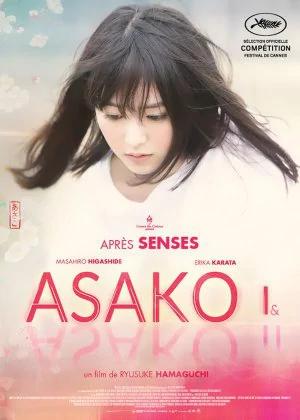Asako I & II

Ryusuke Hamaguchi made a name for himself when he released Happy Hour, an ambitious, expansive, 300+ minute Japanese drama. I wasn't really blown away by it, but it definitely had a few moments of genius and because Japanese directors with international credibility are few and far between nowadays, I was willing to give Hamaguchi another chance. It's a good thing I did, because Asako I & II [Netemo Sametemo] is a big step up from his previous work.
![screen capture of Asako I & II [Netemo Sametemo]](/thumbs/img/articles/1200xauto/asako-1.webp)
Happy Hour was a very natural, organic drama. The kind where your mind is allowed to wander and characters roam free. The kind that Japan does really well. Between Asako I & II and Shiraishi's Birds Without Names though, I can feel there's something brewing. Both films show the marks of a traditional Japanese drama, but are driven by very deliberate and pointed narratives. Somewhat extreme and far-fetched plot constructions steer the drama in different directions, but what happens in between still feels very natural.
The unique thing about Asako I & II is that Hamaguchi seems blissfully aware of this fact. Not only does he embrace the narrative triggers, he even highlights them in playful, cinematic ways. It's a tricky balance though, as ultimately Hamaguchi wants you to be emotionally invested in the drama. On the other hand it's clear that he doesn't want to be completely serious about some of the more constructed narrative turns of the source material (Tomoka Shibasaki's novel by the same name). I'm pretty sure not everyone will be amused by Hamaguchi's approach, but it does add another layer to the film.
The film starts when Asako meets Baku for the first time. The two fall madly in love, but they are both young and Baku is a free-roaming spirit. After 6 months he disappears from Asako's life without a trace, leaving Asako to fend for herself. Two years later Asako meets Ryohei, a boy that looks exactly like Baku, yet who sports a more trusting, nurturing attitude. At first Asako keeps her distance, but when Ryohei starts to court Asako she decides that it's time to forget about the past and to invest in a new relationship.
![screen capture of Asako I & II [Netemo Sametemo]](/thumbs/img/articles/1200xauto/asako-2.webp)
Stylistically Hamaguchi works on two different levels. The more traditional drama scenes are very much in line with what you'd expect from a Japanese drama. An observing camera that lingers and remains quite static, staying in the background rather than demanding too much attention. But whenever the plot kicks in Hamaguchi immediately pushes for a more stylistic finish, with elaborate camera movements and/or slow-motion sequences.
The same goes for the soundtrack. For the greater part it hides in the background, befitting a typical drama score. But whenever the narrative makes a strong push, the soundtrack follows and ups its presence. Instead of soft strings and piano tunes, we're suddenly getting loud synths that indicate we're watching a pivotal moment in the film. In combination with the visuals it creates a sizable impact, one that's hard to glance over but still doesn't feel too out-of-place.
The acting is overall strong, with standout parts for Masahiro Higashide and Erika Karata, the lead duo. The style of acting is typically Japanese though, which means emotions are quite subdued and character actions may appear a little confusing and contradictory at times. Not everything is spelled out, but if you're familiar with Japanese dramas it shouldn't be too hard to keep track of the emotional state of the characters. The secondary cast is solid too, though it's really all about Higashide and Karata.
![screen capture of Asako I & II [Netemo Sametemo]](/thumbs/img/articles/1200xauto/asako-3.webp)
Asako I & II feels like a film of a confident director. Someone who knows the rules well enough to break them. While some earlier twists and turns in the film are within the realm of the acceptable, the latter ones almost make it a conceptual drama. Even so, these narrative follies do move the characters to interesting places and the drama that comes from it is definitely worthwhile. In the end it's all about maintaining a fragile balance, one that's definitely susceptible to personal taste, but in my eyes Hamaguchi succeeded with flair.
I do feel that Asako I & II is a film that benefits from familiarity with the genre in order to fully appreciate the choices Hamaguchi made here. There's quite a lot of quirkiness to get through, but on the other side of that lies a beautifully made, emotionally touching and deeply humane drama. With this film Hamaguchi made quite a statement and hopefully he'll continue down this path. I'm not quite sure what the future has in store for him, but I'm sure that I'll be keeping an eye out for his next film.